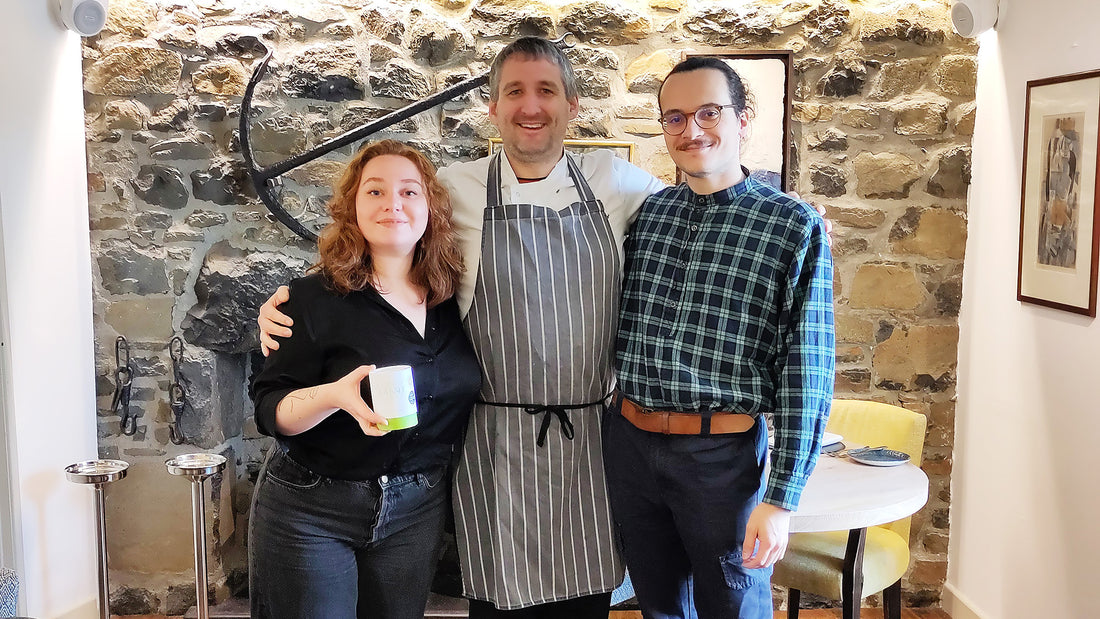We were honoured to have the opportunity to talk to the extraordinarily accomplished Scott Davies, Head Chef of the equally exceptional, Skye-based restaurant, the Three Chimneys. Scott told us of his rich culinary background, the sustainable ethos of the Three Chimneys and why he loves to use our sea salt.
Scott Davies’ Culinary Career:
Scott was born in South Wales. He moved to Scotland when he was 16, where he attended a catering college in Dundee. Scott’s first job was as a Commis Chef at the Carnoustie Golf Hotel. Over 2 and a half years he learned all the basics, laying the foundations to build what would be a fabulous culinary career. Right from the onset, Scott was a chef who liked to take the utmost care over each dish, disliking the mass production that banqueting brought.
Aged 19, Scott joined the beautifully-located Seafood Ristorante in St Andrews. During his year there under fellow Dundee-educated chef, Craig Millar, he was taught how to cook fresh fish, oysters, and shellfish simply and beautifully, to high standards. A vital skill for any chef on Skye.
“There was a lot of not wasting things, a lot of respect for the ingredients.”
- Scott on his time at the Isle of Eriska Hotel.
Scott wished to further expand his culinary expertise and moved to the Isle of Eriska Hotel. Under the tutelage of Robert MacPherson, this is where Scott learned how to respect every ingredient. This meant never wasting anything, using every part, and learning how to bring out the best that each part had to offer. Robert MacPherson also focussed hugely on using only local produce. These are two principles that Scott has continually advocated throughout his career. Robert MacPherson encouraged Scott to experience the next level up, so he did a stage at Martin Wishart’s Michelin Star, Edinburgh's historic port of Leith. Here he assimilated Michelin Star level skills in cooking and service.
“I just love cooking. Love work, I love my routine.”
- Scott on why he was drawn back to the kitchen.
Inspired by Robert MacPherson’s travels around Australia at the same age, Scott, aged 22, ventured to Australia. However, Scott’s travelling did not last long; his passion for cooking was so profound that it drew him back into the kitchen and he started work at The Point, in Melbourne, under Scott Pickett. With Scott Pickett’s guidance, he mastered the art of sumptuous sauces and splendid stocks. The year that Scott was promoted to Jnr Sous chef and they won a prestigious Chef’s Hat award.
“Everybody uses Scottish produce because it’s one of the best in the world.”
- Scott on his time at Glenapp Castle.
Scott returned to bonnie Scotland, working at Glenapp Castle under Adam Stokes. By this time, Scott was a Junior sous chef level and highly skilled in the Saucier section. Although he was already greatly experienced, Scott is a chef who is always hungry to learn more, so he threw himself into improving his pastries and larder, perfecting a range of breads, desserts, chocolates, and cheeses. Adam Stokes, concentrated on using Scottish produce and traditions, something many British chefs do, Scott says, as it is regarded as one of the best in the world. Wild mushrooms, herbs, and game were sourced directly from the estate. Scott learned how to make delightful Scottish dishes, such as haggis and cranachan soufflé.
Scott joined the Rusacks Hotel, in St Andrews, as a Sous Chef. Within 6 months he was made Head Chef, at only 25! In the first 9 months of being Head Chef, he took the hotel from one AA Rosette, to an extremely impressive three AA Rosettes. Scott then went on to work as Head Chef at The Adamson, where owner, Julie Lewis, encouraged Scott to do MasterChef: The Professionals in 2013, finishing runner-up. His time on MasterChef did wonders for building his confidence in public and wonders for business, with covers swelling to an astounding 250 per day!
The Three Chimneys’ History and Sustainability:
When Michelin Star chef, Michael Smith, left the Three Chimneys, he recommended Scott as one of his possible replacements. After an interview, Scott became Head Chef at the Three Chimneys in 2015 and the rest, as they say, is history. Nestled by the gorgeous Loch Dunvegan, the Three Chimneys was first opened in 1968 by Joy and Peter MacAskill as a tearoom, and soon expanded to opening in the evenings to serve local seafood. In 1985, Shirley and Eddie Spear took over, realising their dream of running a bistro that prided itself on all the best local produce. Overtime, with the addition of Michael Smith in early 2003, the Three Chimneys became an industry-renowned, fine-dining restaurant, still with local produce at its heart, a legacy Scott Davies and current owners, the Wee Hotel Company, continue today.
“As a chef, just speaking to the producers, the growers, the crofters, the fishermen every day, it's such a great relationship. The legacy of the Three Chimneys is to understand how precious the food is. Respect it, not to waste it. That's what we're trying to teach at the Three Chimneys.”
- Scott on the ethos of the Three Chimneys
At the Three Chimneys, Scott and his team have gained a real respect and understanding of nature from working with all their many local suppliers, such as Isle of Skye Free Range, Tier One Hunting Solutions, Skye foragers and ourselves, of course. The Three Chimney’s core ethos is to serve meals of the highest quality, while harmonising with nature’s rhythms and understanding all the years, out in the elements, that have gone into producing each ingredient.
Why Scott Davies Chooses Isle of Skye Sea Salt:
Scott kindly spoke about why he loves to use our sea salt crystals at the Three Chimneys – his appreciation of our innovation and sustainability; how sea salt harvested from natural evaporation is completely different from refined sea salts using salt pans; and our sea salt’s unique taste.
“You've got beautiful, beautiful salt. Best salt in the world I have ever had.
It's quite amazing [because] when we think of [the natural evaporation of] salt, it is obviously in a warm climate, a Mediterranean process. And you think it wouldn't have worked on Skye. Your salt is finished naturally. A lot of places still finish it in cauldrons. There's big cauldrons of seawater boiled, … produced by electric or gas … reduced down to a completely different product. So [Isle of Skye’s Sea Salt] is just really clean. I think it's amazing the fact of how green your product is.
This amazing product, it's almost sweet. When you have it even simply on tomatoes. It's the best way to explain it. It just makes it sweet. The flavour is incredible.”
When we asked Scott to describe the Isle of Skye Sea Salt Crystals in a few words, he replied:
“Isle of Skye Sea Salt for me is the best of Skye. It's directly from nature - the purity and the sweetness.”

